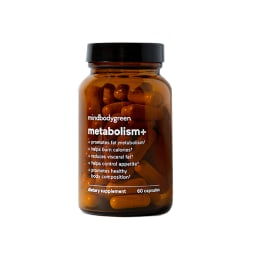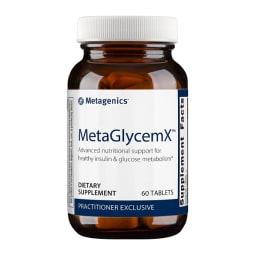That said, many people still struggle to bolster their metabolic health. Between the standard American diet and sedentary lifestyles becoming more and more prevalent (hello, desk jobs!), most of the U.S. population isn’t metabolically healthy—a whopping 88%, to be exact. Additionally, only 6.8% of Americans1 have optimal cardiometabolic health, according to a 2022 study published in the Journal of the American College of Cardiology. Among the cardiometabolic health components analyzed, prevalence of excess adiposity (i.e., overweight and obesity) and poor blood glucose levels both worsened since 2000. Based on all of this evidence, we know two things to be true: “Technically, your metabolism is literally everything your body does with everything else. But when we’re talking about weight, it’s important to understand that [metabolism] is about energy production in your body. So, what we’re speaking of when we want to have a ‘healthy metabolism’ is the ability to produce energy,” explains New York Times bestselling author and metabolism expert Cate Shanahan, M.D. During this cellular metabolism, calories from foods and drinks are combined with oxygen to produce energy (ATP) that your body needs to function properly. This ATP is then distributed to all of your cells, as needed. Thanks to this energy generation and ultimately energy burn (i.e., utilization), your organs and tissues can all do their jobs—the lungs can breathe, the heart can continue beating, leg and arm muscles are able to move, the brain can keep up with cognitive processes, and so on. Metabolism also supports myriad facets of cardiometabolic health by modulating blood glucose and blood lipid levels, regulating blood pressure, and even bolstering healthy inflammatory pathways. In short, a healthy metabolism atunes multiple actions and functions of metabolic health. That said, metabolism and body composition are significantly affected by both intrinsic factors unique to an individual (e.g., genes, adipose tissue, hormones, insulin sensitivity, gut microbiome, appetite regulation pathways, and muscle mass) and extrinsic factors influenced by the environment (e.g., nutrition, sleep, physical activity, and external stressors). While we can make significant lifestyle changes to the extrinsic factors that affect metabolism, there are a lot of gene-driven intrinsic factors that are more difficult to influence. When combined with daily energy-balancing efforts via healthful nutrition and regular physical activity, a quality targeted supplement can help individuals holistically support their metabolic health.* According to functional medicine nutritionist Brooke Scheller, DCN, CNS, the majority of us can benefit from a metabolism booster supplement.* “They’re not just used to encourage a healthy weight but help to optimize how our body uses the food we eat and converts it to fuel. This supports balancing healthy blood sugar levels and how we tap into alternate fuel (stored fat) to create energy,”* she explains. That said, certain supplement ingredients have demonstrated impressive results in promoting fat burn, optimizing body composition, supporting healthy blood sugar levels, regulating appetite and hunger hormones, and more in clinical studies.* Here are some effective ingredients to look for in metabolism booster supplements: Plus, you can save 10% on your first order with promo code MBG10. Metabolism and metabolic rate are closely related. Metabolic rate can be broken down into three different components: resting metabolic rate (aka resting energy expenditure, or REE), thermogenesis, and energy burned during physical activity. REE refers to the amount of energy (i.e., calories) burned to keep all those “basic” physiological functions running when the body is at rest. REE happens to make up the bulk of our total daily energy expenditure, or use. Thermogenesis describes the process of heat generation (the primary product of metabolism) that occurs as a result of food intake and activation of brown adipose (fat) tissue and supports whole-body energy balance. The third and final way we expend energy (i.e., burn calories) is through physical activity—which includes any daily movement we engage in, no matter the intensity. Daily metabolism and metabolic health are critical for promoting not only a healthy weight and body composition but also overall health and well-being. There are many variables that influence the health and efficiency of our body’s metabolism and metabolic rate—including age, body composition, muscle mass, biological sex, thyroid health, physical activity, dietary patterns, and even our genetics and epigenetics. When used in conjunction with healthy lifestyle habits (e.g., a well-balanced diet, regular physical activity, getting adequate sleep, sufficient stress management practices, etc.), a premium metabolism supplement can further bolster metabolic health and function.* Once you’ve incorporated one (or many) of these healthy habits, introducing one of these targeted supplements to your daily wellness routine is an easy and effective way to further support a healthy metabolism.* To learn what registered dietitians, hormone health coaches, neuroscientists, functional medicine nutritionists, and more think of mbg’s metabolism supplement formula, read their raving reviews of metabolism+ here.
















